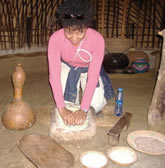Feature: Where in the World is Hopkins Nursing? | Next Section >
“Traveling to Singapore for my Student Leadership Rotation has definitely made me a better nurse,” says Sarah Ferguson, who graduated as a member of the accelerated class of 2005. Ferguson, like many other Hopkins nursing students, is finding that international collaboration leads to better nursing care on a global level. “Not only did I learn about oncology nursing, but a great deal about research and cultural competency as well.”

Ferguson is one of many Hopkins nursing students traveling around the globe to gain international experience in nursing practice and research. Last summer, she and three classmates from the accelerated class of 2005 traveled abroad to complete the final 200-hour clinical rotation required to receive their degree. At the same time, three students conducted research under the guidance of school faculty members in Durban, South Africa, and Seoul, South Korea.
In China, Michelle Charron and Valerie Meschkat conducted their clinical rotation in the medical surgical unit at Beijing United Family Hospital. And in Singapore, Ferguson and her classmate Erin Abu-Rish worked at the Johns Hopkins International Medical Center.
Ferguson and Abu-Rish worked on an inpatient oncology unit where most of the patients were from the United Arab Emerites. Patients and hospital staff spoke a wide variety of languages and came from diverse backgrounds. “In addition to improving our clinical skills, we learned how to work with interpreters, language barriers, and nurses from other countries,” explains Abu-Rish. Ferguson adds, “This was a tremendous learning experience for me.”
The two students developed a unit training module for nursing Muslim clients. The training includes common Arabic words and phrases, as well as an explanation of Islam, prayer (salaat), food requirements, hygiene, and gender considerations.
In South Africa, students Deitra A. Wynn MSN ’06 and Alicia Tanner ’05 were conducting research at the University of KwaZulu-Natal in Durban. “I now have a much better understanding of how culture can affect health and health decisions,” says Tanner. “I was studying the progression of HIV/AIDS during pregnancy, and we had a serious problem with large numbers of women dropping out of the study. I now realize how important it is for nurses to act as patient educators.”

Wynn’s research team studied ways to prevent adolescent substance abuse. Through focus groups, the team would determine the best communication strategy to use to reach their goal. Wynn developed a guide for the focus groups, and trained other members of the research team to conduct an effective focus group.
Student Tyler Cornell ’06 traveled to Seoul, in South Korea, to work with the Korean Human Resource Development Institute for Health and Welfare. Her research team designed a training program for the staff of the Korean Public Health Centers, aimed at promoting smoking cessation and prevention activities.
Wynn, Tanner, and Cornell conducted their global research through the Minority Health and Health Disparities International Research Training (MHIRT) program, designed to provide opportunities for top-notch students from populations that experience health disparities, economic disadvantage, or under representation in health research career fields. Students travel abroad—working with faculty members to receive training and experience in literature review, data collection, research methodologies, writing results—and attend and present at research conferences. The research that they conduct benefits both the student researchers and the communities that they visit.
“I have seen many students make tremendous strides in their careers and academic lives,” says Fannie Gaston-Johansson, principal investigator for the Global Health Promotion Research Program, which is funded through the MHIRT award. “After an international experience in the program, students become more effective scientists in a multicultural and global environment.”